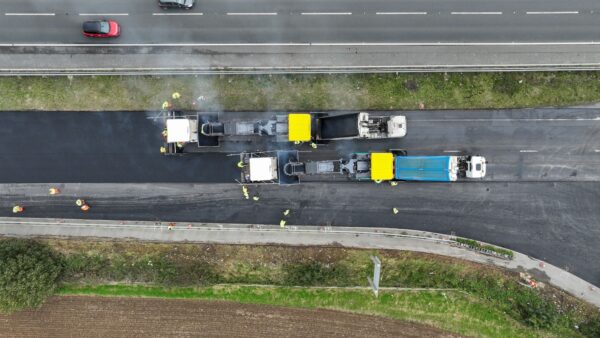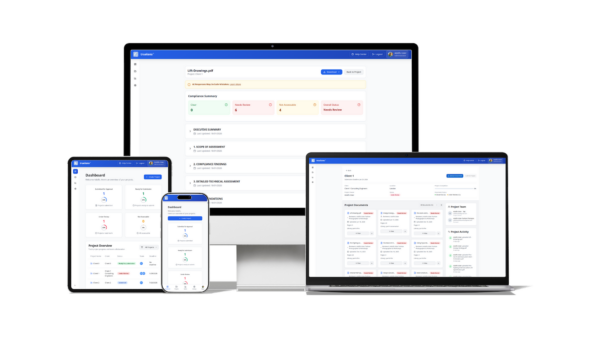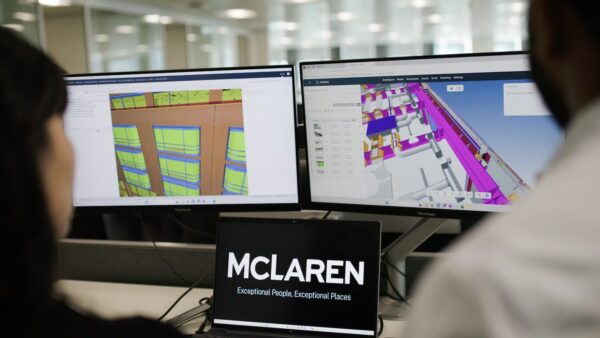
Structured data and informed human oversight – the basics of information management – will be crucial as the programme management office (PMO) function goes through digital transformation.
That was one of the key messages from the CIOB and Trimble webinar, staged as part of the Digital Construction Summit. The webinar paves the way for the launch of the Digital Programme Management Office Playbook, which is being developed by the CIOB Digital & Innovation Advisory Panel and is expected to be published in early 2026.
James Daniel, head of digital engineering at HS2 Ltd, emphasised the need for structured data and capable staff to understand that data. “The HS2 environment supports about 3,500 businesses, which is roughly about 30,000 people. You have to understand that when you’re starting to implement digital tools or AI, you’ve got to make sure that your people are involved and are supported through that process.
“Within my own organisation, it’s a case of understanding how we can make sure that our workforce has the right capacity, has the right abilities and the right skills, and the right tools to deliver. We’re making sure we’ve got the right data in the right place, and that it’s structured properly. A lot of groundwork goes in at the beginning of understanding what our ontologies are, how things relate to each other, how they talk to each other, to embed the next phase of tools and systems.
“Tools such as AI and machine learning are so powerful and so important, but of course, you have to make sure that your house is in order, your data’s correct, and everything you’re doing is set up in a way where you get the results that are honest and real, as opposed to fractured or broken or giving you misinformation.”
Digitising PMO Playbook explained
Stefan Mordue, vice-chair of the CIOB Digital & Innovation Advisory Panel and senior manager of education and partnerships at Bentley Systems, explained what the industry can expect from the playbook.
“It’s designed to be a practical guide that shows how digital approaches to programme and project management can really add value, whether it’s improving productivity, quality, sustainability or even compliance. It’s all about helping organisations move from talking about digital to actually doing it, whether using systems, better systems, data or better collaboration to deliver projects more efficiently and with greater confidence,” he said.
“The diversity of the panel – industry practitioners, suppliers and academics, including non-UK perspectives – has really helped shape our thinking and makes the playbook relevant whether you’re delivering a huge infrastructure programme or managing a much smaller local project.
“The playbook has six core themes:
- productivity and quality – how better data and connected systems can help manage change and performance, and reduce rework;
- sustainability and circularity – how digital supports things such as carbon tracking, modular design and circular economy thinking;
- safety and compliance – focusing on the Building Safety Act and the golden thread and how these principles also apply in an international arena;
- people and upskilling – looking at the cultural side of digital transformation and looking at the skills that we need to make that happen;
- information management and standardisation – things such as open data, interoperability, alignment with ISO and PMO frameworks; and
- case studies and practical tools.
“We’re trying to make it technology agnostic, it’s not about promoting any specific tools or platforms. It links to other existing CIOB resources, like the Client Guide and the AI Playbook.”
David Philp, chair of the CIOB Digital & Innovation Advisory Panel and chief value officer at Bentley Systems, noted that the playbook is intended for construction businesses and projects of all sizes.
CIOB members and interested parties who would like to contribute to the Digitising PMO Playbook should contact Philp and Mordue.
The human in the loop
Jennifer Whyte, professor at the University of Sydney and Imperial College London, highlighted the role of the human as AI steward – someone who can think critically about the outputs that AI tools deliver. Such a person, the so-called ‘human in the loop’, needs the “ability to discern the [AI-generated] answer and whether it’s real or not. I think that ability to understand the answer and that professionalism to know whether it’s the right answer becomes extremely important,” she said.
David Philp, chair of the CIOB Digital & Innovation Advisory Panel and chief value officer at Bentley Systems, added: “No matter where you are as an actor or actress in the built environment, you need to understand the importance of data – how to collect clean construction data and interpret it. Data literacy – the basic familiarity with data concepts – is important.”
Whyte reminded the audience: “AI is not going to fix poor data or an unclear strategy. If your data is fragmented or biased, your AI forecasts will be too.”
Turning to her research role, she noted: “What we’re seeing is a real focus on things like AI in project oversight and assurance, and how we can use AI to get access to the key data that would otherwise be buried in thousands of pages of reports, or many, many drawings. How can we prompt it and set it up to ask the right questions so that it’s not just generating more data that we have to scroll through?”
The legal angle
May Winfield, global director of commercial, legal and digital risks at Buro Happold, offered several warnings to the audience. First, she highlighted historic data: “We know that historical data has some bias issues – how are you going to deal with those issues?”
Second, she warned about the unauthorised use of AI tools, highlighting the Microsoft 2024 Work Trend Index that said: “78% of AI users are bringing their own AI to work without telling their employers”.
Winfield said: “I suggest you look into how you approve tools and how you prohibit the use of certain tools. This requires the combination of the IT, the legal and the business people [within a business], all sitting together and working out a process. There’s not one part of the business that can fix all the problems.
“People want to do the right thing, but if you don’t provide them with best practice and guidance, they could – accidentally – be putting your business at risk.”
The Digital Construction Summit takes place from late October until early November. The series of webinars – supported by Elecosoft, Glider, RIB Software, Trimble, CIOB and Construction Management – brings together leading voices from across the construction sector to explore the future of digital transformation.















